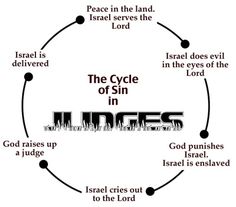
Have you ever been plagued by doubt? If you say “No!” I doubt that I can believe you. Do you know why? Because doubt is based on our experience. It is a self-protection mechanism within us. We don’t want to face disappointment anew, so doubt protects us from becoming gullible and being taken in too easily.
Doubt in and of itself is not evil. It helps make you reflective. It slows down your response in the face of danger. At the same time, doubt can lead you to stop when you should be moving forward. Doubt throttles down action that shows trust. Because of that, believers sometimes feel they must hide their doubt from the God they serve. The problem is, God already knows what you are doing. The other problem is such hiding indicates you may not believe God is as He truly is. Let me see if a principle from the life of Gideon helps with this…
Key Principle: The believer who honestly shares with God personal doubts (but continues to follow God anyway) will find God both compassionate and understanding.
God doesn’t get easily ticked off about our lack of faith in Him – as long as it doesn’t stop us from obedience. The lesson today will help us grapple with doubt in an open way before God. In truth, the best single word to recall the whole of the Gideon story in your mind may simply be the word “doubt”.
If you look carefully, you will discover the account of the ongoing dialogue between Gideon and God is one filled with his objections and doubts – yet God was patient and used him. I don’t believe any President would keep a chairman of the joint chiefs if they pushed back so much about so much – but God isn’t like us. Look at Gideon’s track record with God:
First, at the scene of his call to serve, Gideon objected to God’s behavior. What God was doing in his time of history didn’t make sense to him (6:13-14).
Judges 6:13 Then Gideon said to him, “O my lord, if the Lord is with us, why then has all this happened to us? And where are all His miracles which our fathers told us about, saying, ‘Did not the Lord bring us up from Egypt?’ But now the Lord has abandoned us and given us into the hand of Midian.”
Second, and still in the scene of his call, Gideon’s second objection seemed to be concerning God’s choices. He felt others were more qualified than he to lead Israel to freedom (6:15):
Judges 6:15 He said to Him, “O Lord, [h]how shall I deliver Israel? Behold, my family is the least in Manasseh, and I am the youngest in my father’s house.”
Third, Gideon needed reinforcement on the authenticity of the messenger as from the Most High, or he wouldn’t move forward to rescue Israel. He objected to God’s call without surety that it was from God. It is on this issue that Gideon was stuck over and over.
It is almost as if the story of Gideon in the Bible was mostly about following God through a doubt-ridden time.
The reason it may seem that way when you read it, is because that is EXACTLY what the narrative is designed to teach. Watch as Gideon keeps requesting confirmed authentication, beginning with Judges 6:17:
6:17 So Gideon said to Him, “If now I have found favor in Your sight, then show me a sign that it is You who speak with me. 18 Please do not depart from here, until I come back to You, and bring out my offering and lay it before You.” And He said, “I will remain until you return.”
Gideon got his authentication, and God tapped him for an immediate project that night. He was told to destroy two pagan shrines, and he did so WITHOUT A QUESTION. God used that obedience to spread the name and reputation of Gideon to both his village, and the whole surrounding tribe!
To be fair, Gideon didn’t always object when God moved him to lead or serve. The record shows clearly that when he KNEW without a doubt that God was calling, he was willing to act decisively. He would obey, but he just couldn’t always make sense of God’s direction or God’s selection. Can you sympathize with him?
I am speaking to the man who is sensing that a change is coming in his job. He knows there is more he can and should contribute, but there hasn’t been obvious opportunity to grow in the job in a way that allows him to utilize his abilities. He knows there are better opportunities. How can he know if God wants him to take a chance and make a change?
I am thinking specifically of the young woman who was hoping that, by now, “Mr. Right” might come along. She believes God has tugged her heart to being a mother and a wife, but the prospects have been ever so thin. She wants to follow God’s leading, but she feels a bit stuck where she is.
I am wondering about the man who walked out of the doctor’s office unsure of the meaning of the diagnosis and how it will affect him and his family. He was blind-sided by the whole moment, and is struggling with God to find the meaning behind it all.
The record of Gideon’s struggle was given for all of them. Each one is facing a kind of confusion and disappointment that is hard to work through. Yet, God doesn’t want them to back away from Him and hide. The believer who honestly shares with God their doubts (but continues to follow God anyway) will find God both compassionate and understanding.
Follow the account of his life in the text a bit further. A little later in Gideon’s life (the time is not specified in the passage) the Spirit of God tugged once again on the heart of Gideon. He used a warrior’s trumpet to call the tribal force together (6:33). He sent messengers to the neighboring northern tribes (6:34). After he set the gathering in motion, he had some time to think about what lay ahead… and those nagging doubts rose again in his heart. The writer reminds:
Judges 6:36 Then Gideon said to God, “If You will deliver Israel through me, as You have spoken, 37 behold, I will put a fleece of wool on the threshing floor. If there is dew on the fleece only, and it is dry on all the ground, then I will know that You will deliver Israel through me, as You have spoken.”
The story unfolds TWO separate incidents where Gideon requests signs for authentication. One was a wet fleece and dry ground, the second a dry fleece and wet ground. It appears from the narrative the test took place over two nights, and God obliged his request. On the second morning, the test made clear:
Judges 6:40 God did so that night; for it was dry only on the fleece, and dew was on all the ground.
After Gideon saw the signs, chapter seven reminds us that he swiftly moved on the command to call Israel to war. The chapter began with the fact that he and his men “rose early” and moved into position in the Harod Valley by the spring. If you have been following our story, you know that God tested Gideon back – calling his army too large to clearly deliver them without the possible misunderstanding that the people’s help was integral in the victory. God dismissed all but 300 men from the battlefront.
When we pick up our reading of the story again, the once swollen camp of Israel was now reduced to a skeleton crew, and night was drawing near. As the hundreds of campfires of Midianite and Amalekite warriors lit up on the sloping hill above the tiny Israelite squad, Gideon had yet another fear attack that overcame him. The text recorded it this way:
Judges 7: 9 Now the same night it came about that the Lord said to him, “Arise, go down against the camp, for I have given it into your hands. 10 But if you are afraid to go down, go with Purah your servant down to the camp, 11 and you will hear what they say; and afterward your hands will be strengthened that you may go down against the camp.” So he went with Purah his servant down to the outposts of the army that was in the camp.
Note several important details about the account:
• First, God gave Gideon a command – go down to the camp. God made perfectly clear to him what He expected. Obedience or rebellion appeared to be the choice.
• Second, God made a promise – the victory was assured for His people. He spoke of the victory was a “done deal” – I HAVE GIVEN their camp into your hands.
• Third, God offered an encouragement – if Gideon still needed more reinforcement, God offered a plan to meet his need. In the face of fear he was to find a friend and take a walk behind enemy lines and listen to the men around the camp fires. If he took the time to observe up close what was happening, he would be reinforced and ready to fight.
The way the passage is translated, it sounds like God offered an option only IF Gideon was too afraid – but that isn’t the real picture. The structure of the sentences is such that we should read it this way:
“I want you to go and fight, and I promise that you’ll win. Because you are afraid, I want you to find encouragement by taking a friend on a walk and observing something…”
Don’t skip over the ironic way the passage tell you of the size of the enemy:
Judges 7:12 Now the Midianites and the Amalekites and all the sons of the east were lying in the valley as numerous as locusts; and their camels were without number, as numerous as the sand on the seashore.
The point of explaining the number in terms of locusts and counting camels like sand kernels was simply this: there were too many enemies to even begin to count effectively. Yet, if you look down a few verses (7:16-18) – in the case of Gideon, God pared down his number, and offered the reader a strict inventory of what He used: The weapons blessed of the Lord included:
• 300 trumpets made from rams horns
• 300 earthen water pitchers
• 300 torches concealed inside the water pitchers.
• 300 swords
The size of the problem from God’s perspective isn’t the same as from our view.
• To Gideon’s enemy, with their thousands of Midianites, each with camels and swords, they were an overwhelming force. As he and his servant Purah journeyed into the Midianite camp, Israel’s commander was so insignificant, no one would even ask him why a local was drifting from fire to fire in the dark of the night. The Midianites looked unstoppable!
• To Gideon, there was no way he felt significant in front of the sprawling encampment that spread across the valley onto the lower slopes of the Hill of Moreh. He stood no chance taking on such a massive number of enemies. If they chose to turn on him in the camp, he was finished.
That’s what insurmountable problems do. They make us feel small, overwhelmed and defeated.
Now stop and consider the view the Lord of Creation had of the same event. From beyond the quintillion galaxies, He peered to one tiny solar system. He focused on one small planet spinning around a star. On a tiny speck of that rock in space, He observed a minuscule landscape on which His people were dwelling. Bearing down further, He saw the sloping hillside and watched two men walk from the Israelite camp to the Midianite one.
I am not being poetic. The point is that is how God sees your problem. It looks HUGE to you – but not to Him. You cannot imagine how much greater God is in size than your insurmountable issue! The vastness and magnificent power of God should help balance you in times of depression against an unstoppable foe.
Don’t lose track of what God did. In a story where a hero saves his people, you’re usually dealing with a person of strength, great intellect, personal charisma and beauty, or enormous material resource. Gideon was none of these. At the beginning of the story he seemed a bitter and weak farmer, but in God’s hands he was transformed into an effective warrior and leader. One chapter into his story, you can easily forget that he really wasn’t that different. What changed was God walking with him through his days and nights. What changed wasn’t new muscle – just new trust… and that wavered constantly. What he experienced was a personal revival of sorts.
Underlying Gideon’s constant need for assurance was his basic temperament. Think about what he said when God first met him, because it revealed the kind of man he was at his core. He hid in a hole, because he felt overwhelmed by the size of a problem around him. Yet, it was more than that. Two things appeared to contribute profoundly to his cowardice: bitterness and timidity. Locked into a situation he couldn’t control, Gideon expressed open frustration because God was not coming through for him. Worse than that, Gideon felt that he had little or nothing to offer to help improve things. Have you ever faced a time when the problems were so large, and your resources so outmatched, that you honestly wondered what God was thinking putting you into something like that? God is always doing the very same thing – He is telling His story.
His view is greater, and His purposes are more vast and interconnected than we can perceive from where we are.
Take a walk with Gideon and Purah. Notice that God didn’t tell Gideon to go alone. The sheer size of the enemy camp couldn’t have meant that God intended Purah to protect his commander. That wasn’t the reason he went with a friend. The truth is, most of the deep lessons of God are learned within, but bonded more firmly to our hearts when a friend can remind us of what God did later. Taking a friend on a journey to the place where God overcame your doubts will help both of you!
This week I read about one of the dynamic preachers in America from my school years – Dr. E.V. Hill. I first heard him when I was in Bible college. He was an energetic African-American pastor who had a congregation in Los Angeles. Since those days, just a few years ago he lost his wife of many years of marriage after her battle with cancer. Hill often describes his wife as a partner that made him a better man. He makes the point by telling some stories of how his wife made a difference in him:
He noted that in their early years of marriage he was a struggling preacher and had trouble earning a living. At one point, he decided to invest his family’s scarce resources over his wife’s objection in a local service station. His wife was right and eventually the station went under. It was a critical time in the life of E.V. Hill and his wife would have been justified in saying: “I told you so.” But when E.V. Hill told his wife what happened she just replied; “All right.” When he came home he was expecting his wife to give him the business. Instead she said: “I’ve been doing some figuring. I figure that you don’t smoke and you don’t drink. If you smoked and drank, you would have lost as much as you lost in the service station. So it’s six in one hand and a half-dozen in the other. Let’s forget it.” She could have shattered her husband’s confidence, but she told her husband what he needed to hear: “I still believe in you.”
A few nights later E.V. Hill came home and his wife had prepared a candlelight dinner. She said, “We’re going to eat by candlelight tonight.” He went to the bathroom to wash his hands and the light would not turn on. He felt his way to the bedroom and flipped another switch. Darkness prevailed. He went back to the dining room and asked his wife why the electricity was off. She began to cry. She said, “You’re working so hard and we’re trying, but I didn’t have enough money to pay the light bill. I didn’t want you to know about it, so I thought we would eat by candlelight.”
On another occasion Dr. Hill said his wife was his protector. He had received death threats due to his working with gangs in the inner city. One night he received notice that he would be killed the next day. He went to sleep and woke up thankful to be alive. But he noticed his wife was gone. He looked outside and saw the car was also gone. His wife came driving up and he asked where she had been. She said it occurred to her that the bad guys might put a bomb in his car and if he got in it the next morning he’d be blown away. So she got up and drove the car all night. E.V. Hill’s wife demonstrated unconditional love in marriage. She practiced the marriage covenant, “In good times and in bad times…sickness and in health, richer or poorer.”
Sometimes we need a friend to journey with us as God leads us to change…
Stoop and warm your hands beside the fire while men eat a meal and wait for the sunrise sounds of a battle breaking forth. Some men had eaten hours before and drifted off to sleep. Others were standing beside the fire pits talking. Apparently, one man awoke in his sleep roll and came back out to the fire…The account continued:
Judges 7:13 When Gideon came, behold, a man was relating a dream to his friend. And he said, “Behold, I had a dream; a loaf of barley bread was tumbling into the camp of Midian, and it came to the tent and struck it so that it fell, and turned it upside down so that the tent lay flat.” 14 His friend replied, “This is nothing less than the sword of Gideon the son of Joash, a man of Israel; God has given Midian and all the camp into his hand.”
Two men discussing a dream doesn’t seem like enough to erase the sense of enormity of the Midianite camp. Their discussion together did NOTHING to add soldiers back to Gideon’s command. The barley cake dream wasn’t anything of strategic value. No secrets were uncovered, no dramatic weaknesses of his opponents were exposed. Yet, in spite of all of that, Gideon was renewed, encouraged and strengthened. God told him the same thing the men concluded – Gideon would win. Somehow, when he heard it from the mouth of a sleepy Midianite it was more powerful.
God knew that His power was easily able to topple the Midianite coalition forces regardless of their size. God didn’t intend to leave the task to Gideon – He intended to do it WITH him and THROUGH him. That is the way God works. What needed to change for Gideon to lead the troops was his perspective. Pastor Joey Nelson reminds us of that perspective change:
Do you remember the four-minute mile? They’d been trying to do it since the days of the ancient Greeks. Someone found the old records of how the Greeks tried to accomplish this. They had wild animals chase the runners, hoping that would make them run faster. They tried tiger’s milk: not the stuff you get down at the supermarket, I’m talking about the real thing. Nothing worked, so they decided it was physically impossible for a human being to run a mile in four minutes. Our bone structure was all-wrong, the wind resistance was too great, our lung power was inadequate. There were a million reasons. Then one day one human being proved that the doctors, the trainers, and the athletes themselves were all wrong. And, miracle of miracles, the year after Roger Bannister broke the four-minute mile. And the year after that three hundred runners broke the four-minute mile!
I don’t want to seem trite and I don’t want to be dismissive of your fear and frustration if you are facing an enormous challenge. You aren’t Gideon. You don’t have a promise that you will get good news from the next doctor’s visit, that your son’s addiction problem will instantly evaporate, or that your debts will somehow be forgotten. Here is what I do know God has promised you…
2 Peter 1:3 “…seeing that His divine power has granted to us everything pertaining to life and godliness, through the true knowledge of Him who called us by His own glory and excellence. 4 For by these He has granted to us His precious and magnificent promises, so that by them you may become partakers of the divine nature, having escaped the corruption that is in the world by lust.
Listen closely, and if you let them, you will hear the sound of these words growing courage within you.
• God HAS given to Jesus followers what you need to navigate life in a godly way. You don’t have to win every fight – you have to follow Him through every fight.
• God HAS given to Jesus followers a deep and real knowledge of Himself. He is not sadistic or cruel, and He has shared within you even some hidden things of Himself.
• God HAS given to Jesus followers an escape from the “living for today” rat race world we come out from – and helped us see the vast eternal landscape.
Take courage, dear one. God has given you something that will get you through the darkness. It is not a complex plan. It is nothing more than grasping His hand and following His directions – but that is more powerful than a non-believing world can imagine.
What did Gideon do when he heard the story of the rampaging barley cake? He left the campfire, dropped to his knees in the dark of night, and bowed his face to the ground. He met God again. He saw his smallness. He was surrounded by his overwhelming enemy. None of that changed. HE changed inside. He took a moment to see the whole situation from God’s lofty place. The text shares:
Judges 7:15 When Gideon heard the account of the dream and its interpretation, he bowed in worship. He returned to the camp of Israel and said, “Arise, for the Lord has given the camp of Midian into your hands.”
You can hear the urgency in Gideon’s voice. He was now sure that what God told him, God would do. His view of God’s faithfulness was bolstered by his experience. He apparently devised a plan on the walk back, and shared it with his men when he returned. Look at Judges 7:16:
Judges 7:16 He divided the 300 men into three companies, and he put trumpets and empty pitchers into the hands of all of them, with torches inside the pitchers. 17 He said to them, “Look at me and do likewise. And behold, when I come to the outskirts of the camp, do as I do. 18 When I and all who are with me blow the trumpet, then you also blow the trumpets all around the camp and say, ‘For the Lord and for Gideon. 19 So Gideon and the hundred men who were with him came to the outskirts of the camp at the beginning of the middle watch, when they had just posted the watch; and they blew the trumpets and smashed the pitchers that were in their hands. 20 When the three companies blew the trumpets and broke the pitchers, they held the torches in their left hands and the trumpets in their right hands for blowing, and cried, “A sword for the Lord and for Gideon!” 21 Each stood in his place around the camp; and all the army ran, crying out as they fled. 22 When they blew 300 trumpets, the Lord set the sword of one against another even throughout the whole army; and the army fled as far as Beth-shittah toward Zererah, as far as the edge of Abel-meholah, by Tabbath. 23 The men of Israel were summoned from Naphtali and Asher and all Manasseh, and they pursued Midian.”
There are many ideas about what he was doing, but I suspect the one put forth by some Israeli military leaders about the scene is the most accurate. The theory is that the normal army would not attack at night (as the hazards increase between the various squads), but if they faced extraordinary circumstances and did attack, they would issue their men similar torches to identify various squads. If each squad were numbered at one hundred fighters, one torch would represent one hundred men. In that scenario, the exposed torches would confirm to the Midianite and Amalekite forces they were facing some 30,000 men. That probably seemed reasonable to those who saw the army before it was paired down by God!
Look at what he instructed the men to do.
• First, he told them to spread out around the camp in three focal positions and keep an eye on what he was doing. They were to mimic his actions fully.
• Second, he told them to respond to his trumpet blast by blasting their own from their various positions. This would give the impression of a vast force, as the trumpets are used to direct men. The Midianites and Amalekites didn’t know there were no men to go with the trumpets!
• Third, he told each man to cry out: “For the Lord and for Gideon!” There is no way he did this to bolster himself to the men. The point of the saying came from what he heard from the man with the barley cake dream. If that is what people were fretting, that is what his men needed to be saying!
• Fourth, he told them to smash the pots and show their torches. The appearance produced a scramble in the camp. Men took out their swords and began swinging into the darkness. This is the reason night attacks weren’t normally directed – people hurt their own comrades by accident. As the tumult grew, the Midianites and Amalekites – men who were trained in “raid fighting” and not standing warfare – tried to break ranks and flee into the dark. Even doing that caused others to be trampled and crushed.
Some escaped the valley, and Gideon didn’t want their leaders to get back to the desert and re-form for another raiding party. The text continues for the rest of the chapter and tells of how the other tribes joined the search, found and executed the enemy leaders (7:24-25).
The point of the story was that God not only gave the tribes of Israel victory, but He did it while dealing with a doubting and questioning leader. Gideon asked questions and was honest about his fear and doubt – but he didn’t turn and walk out on God. He kept pressing ahead even when doubts plagued him. Here is what we learn…
The believer who honestly shares with God personal doubts (but continues to follow God anyway) will find God both compassionate and understanding.
Author Gayle Thompson wrote this past summer:
Hillary Scott, one-third of the hit trio Lady Antebellum, surprised fans when she announced the release of “Thy Will,” the first single from her and her family’s faith-based album, Love Remains, in April of 2016. The song, Scott later revealed, was written with Emily Wiseband and Bernie Herms following her own personal tragedy, when a much-wanted pregnancy ended in miscarriage. Below, Scott recalls the emotional day on which the trio of tune smiths penned “Thy Will.”
When we were on tour [in the summer of 2015], my husband Chris [Tyrrell] and I just decided we wanted to expand our family. We got pregnant in July and then miscarried in September. And so, “Thy Will” is about me talking to God and asking Him why — like, “Okay, I thought this was a go. We prayed about it. We were going to bring Eisele a sibling,” and for all of it to just kind of not happen. It was my honest conversation with God about, why do bad things happen? But, ultimately, I trust Your will for my life and that it’s all going to be okay…Truly, I believe, [the song] became a pass-through for a message that was a lot bigger than just my own specific thing that I was going through…
The song is called “Thy Will” by songwriters BERNIE HERMS, HILLARY SCOTT, EMILY LYNN WEISBAND.
I’m so confused – I know I heard you loud and clear. So, I followed through. Somehow I ended up here – I don’t wanna think I may never understand that my broken heart is a part of your plan.
When I try to pray – All I’ve got is hurt and these four words… Thy will be done, Thy will be done, Thy will be done.
I know you’re good – But this don’t feel good right now. And I know you think of things I could never think about. It’s hard to count it all joy, Distracted by the noise, Just trying to make sense of all your promises.
Sometimes I gotta stop – Remember that you’re God and I am not, So… Thy will be done, Thy will be done, Thy will be done. Like a child on my knees all that comes to me is Thy will be done
I know you see me. I know you hear me, Lord. Your plans are for me Goodness you have in store. So, thy will be done. Thy will be done.
It sounds like Hillary got peace, even though she didn’t get an answer to her question as to why this happened. In the end, she learned that God could handle her doubts. She took her pain to God, and He gently held it in His hands.
















